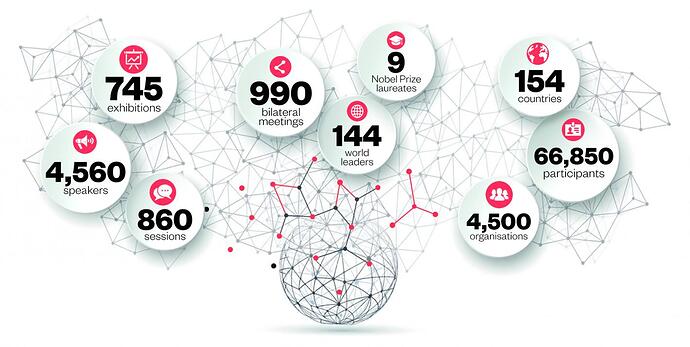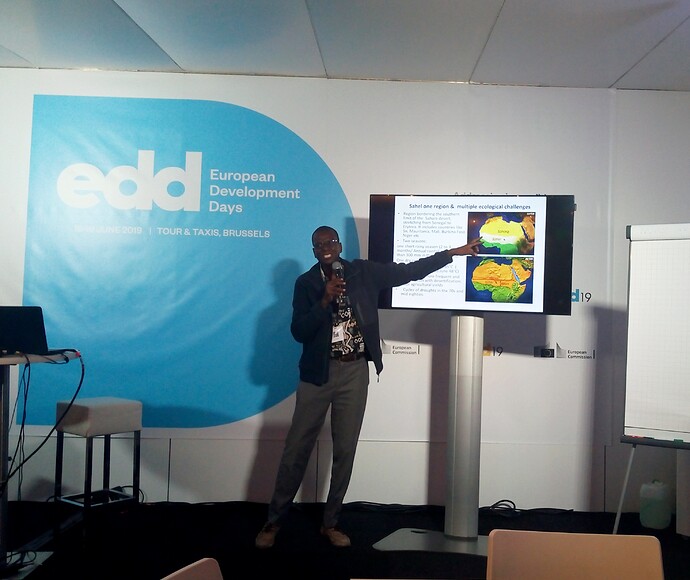The European Commission, since 2006, organizes European Development Days – the leading forum on development and international cooperation. EDDs bring the development community together to share ideas and experiences in ways that inspire new partnerships and innovative solutions to the world’s most pressing challenges. This year’s overarching title was "Addressing inequalities: building a world which leaves no one behind". It highlighted the European Union’s commitment to this subject in line with the goals of the 2030 Agenda for Sustainable Development.
Image source: EDD official website
During these two days I participated in several sessions under the themes “Bridging the digital divide: managing digitalisation and technology for inclusive growth” and “Climate change and environmental inequalities: exploring the interlinkages between climate change, environment and inequality”.
Can open innovation be an answer to development challenges? - the session was based on the debate around technology, its potential as well as threats in fighting inequalities, from classic technology transfer to Open Innovation approaches, incorporating human-centered and inclusive design. A few examples from the speakers:
- Emilio Ciarlo, the Head of External Relations at the Italian Agency for Development Cooperation: the program in collaboration with Politecnico di Milano and Politecnico di Torino based on capacity building - the AfricaInLead
- Cristina Toscano, the Programme Officer at Fondazione Cariplo: the open innovation platform for the development sector COOPEN, linking different stakeholders, communities and local innovators to facilitate alliances and use technology to find common solutions to existing challenges.
Image Source: COOPEN
- Tinna Nielsen, anthropologist and behavioral designer, Move THE Elephant presented designed interventions based on insights from behavioral sciences - the Inclusion Nudges initiative
- Mark Kamau, human centered designer from Nairobi, director of the BRCK, largest public welfare company in Sub-Saharan Africa, working on digital inclusion.
Smart Villages - The road to reduce territorial inequalities and bridge the digital divide – speakers discussed ways to develop innovative technical, financial and business models and solutions to reduce inequalities for local communities.
- While Orange is operating in 20 countries and investing one billion euros per year in connectivity, Maquette Mbow, CEO and the founder of the platform L’Afrique C’est Chic World says we cannot develop Africa from Europe or the United States. “Smart” goes with taking in consideration socio-cultural conditions, the real needs and establishing public-private partnerships.
- For Joachim Goeske, the Head of Department for Global Policy at the GIZ the big issue is the binary understanding of problems which results in losing out of sight other factors – it is important to consider not only how many people are connected to the internet, but what kind of internet they are connected to and how they effectively use it.
Rise of the Eco-Village - how community-based design and supportive technologies are creating new models for equality and sustainability. The session was hosted by the Climate Technology Centre and Network (CTCN) to discuss key aspects of eco-village design from environmental and social considerations to the use of supportive technologies, with examples from Asia, Africa and Europe. A part of the presentations by the UNFCCC and the INFORSE Network, it was interesting to see the examples of grassroots projects led by the communities consciously working to preserve its traditions and natural resources:
- Ousmane Aly Pame is the founder and president of a community-service organization REDES in the Sahel region which saw a collapse of ecosystems and traditional lifestyles – the elders have witnessed their paradise transforming in a lunar landscape in only two generations. Eco-villages are considered to be the response to multiple ecological challenges. The eco-village hubs are inspiring other surrounding villages and raising awareness through educational and cultural activities such as theater and festivals. The Global Eco-Village Network is making visible examples of best practices, and developing educational tools to inspire societal transition to resilience.
If interested, the podcasts of the two wrap up sessions are available here:
June 18 & June 19


